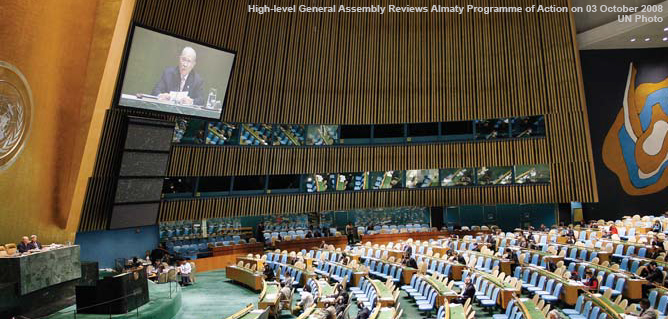
Things to KNOW
- The Almaty Programme emphasizes that success in achieving its objectives would critically depend on the effective functioning of the arrangements for its implementation and review at subregional, regional and global levels. Bilateral, subregional and regional cooperation is the sine qua non condition for establishing effi cient transit transport systems and must be promoted on the basis of the mutual interests of both landlocked and transit developing countries, with the support of the international community. Strong public-private partnerships are also key effective implementation of the Almaty Programme priorities.
- Each year, the Secretary-General of the United Nations reports on the implementation of the Almaty Programme to the General Assembly, based, inter alia, on information provided by Member States and relevant international, regional and subregional organizations. The General Assembly adopts a yearly resolution regarding the specifi c actions required to address the particular needs and problems of the LLDCs.
- A high-level plenary meeting of the UN General Assembly devoted to the midterm review of the Alamaty Programme was convened in New York on 2–3 October 2008, with the objective to assess the progress made, the lessons learned, and the constraints encountered in the first half of the implementation period. The midterm review reported signifi cant progress: the joint efforts by the LLDCs, transit countries, regional and international bodies with the support of the donor community had begun to show visible, concrete results. However much more needed to be done if LLDCs were to overcome their inherent disadvantages. The Midterm Review Declaration (A/RES/63/2) therefore identifi ed concrete actions to be taken by landlocked and transit developing countries, with the support of their development partners, to accelerate the implementation of the Almaty Programme and achieve substantial improvements by the end of the Almaty decade in 2013.
- The Multilateral Agreement on the Establishment of the Think Tank for LLDCs was endorsed by the LLDCs Foreign Ministers during their 2010, held in New York in September 2010. The Think Tank will provide a centre of excellence for high quality research and policy advice and will contribute to further strengthening of the analytical and negotiation capabilities of landlocked developing countries.
- In its Resolution 66/214 of 22 December 2011, the General Assembly decided to hold a Comprehensive Ten-Year Review Conference of the implementation of the Almaty Programme of Action in 2014, in accordance with paragraph 49 of the Almaty Programme of Action and paragraph 32 of the Declaration of the Mid-Term Review.
- The Conference will be preceded by regional and global as well as thematic preparations in a most, well-structured and broad participatory manner. The General Assembly also designated the Offi ce of the High Representative for Least Developed Countries, Landlocked Developing Countries and Small Island Developing States as the focal point for the preparatory process.
- As part of the preparatory process, a highlevel thematic meeting on international trade, trade facilitation and aid-for-trade was held on 13–14 September 2012, hosted by the Government of Kazakhstan in Almaty. The thematic meeting substantively assessed the progress achieved in the implementation of the Almaty Programme Priority Area 3 on international trade and trade facilitation. It examined the major achievements and constraints experienced and deliberated on future actions needed to enhance the participation of LLDCs in the international trading system while further strengthening the global partnership for establishing effi cient transit transport systems.
- Regional review meetings, in Africa, Asia, Europe and Latin America, will be held in 2013 in close cooperation with the relevant United Nations Regional Commissions.
- Strengthen institutional cooperative arrangements, including the private sector, for trade and transport facilitation with a view to establishing clear and harmonized regulatory frameworks to promote and support initiatives at the corridor or regional level.
- The Offi ce of the High Representative for the Least Developed Countries, Landlocked Developing Countries and Small Island Developing States continues to assist landlocked developing countries by mobilizing international and United Nations system-wide support by raising awareness of their special needs. These efforts have resulted in LLDC issues increasingly becoming a top priority for the international community.
Things to DO
- Promote bilateral, regional and subregional cooperation in order to establish effi cient transit transport systems, on the basis of the mutual interests of landlocked and transit developing countries.
- Strengthen institutional cooperative arrangements, including the private sector, for trade and transport facilitation with a view to establishing clear and harmonized regulatory frameworks to promote and support initiatives at the corridor or regional level.
- Develop integrated trade and transport infrastructure projects with a corridor-based approach in order to increasingly attract aid for trade funding.
- Further promote South-South cooperation and triangular cooperation with the involvement of donors.
- Support LLDCs’ efforts at better data collection and analysis to monitor the progress being made in implementing the priorities of the Almaty Programme.
- Develop generally accepted corridormonitoring indicators to measure the performance of trade corridors linking landlocked developing countries to seaports and their progress on changes in logistics and trade facilitation practices.
- The development partners should provide appropriate fi nancial and technical support to the LLDCs and transit developing efforts to systematically collect and analyze relevant data required for monitoring progress in implementing the priorities of the Almaty Programme.
- The Offi ce of the High Representative should continue to mobilize international awareness and support and focus attention on the implementation of the present Programme of Action.


